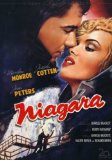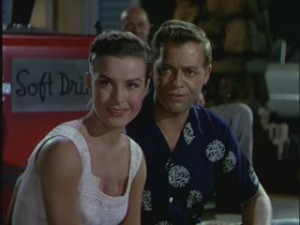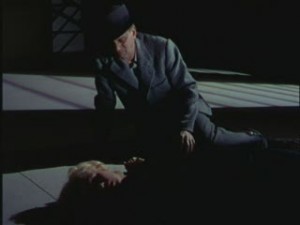“A Gripping Murder Melodrama Loaded with Sex and Suspense.” – The Hollywood Reporter
REALLY?
Niagara marks a departure from the usual Marilyn Monroe fare – here she plays a conniving and deceitful wife plotting to have her husband (played by Joseph Cotten) murdered. Directed by Henry Hathaway and running a taut eighty-eight minutes there really isn’t time for much. If you go into this with such expectations you’ll find a fairly entertaining movie. For the Hitchcock fans out there the film does have a few similarities with those of the master himself. Let’s not go overboard here though.
 Ulitimately the plot is a non-issue as the resulution is completely unsatisfactory and the steps to get there are nothing truly unique. Monroe and Cotten are vacationing at Niagara Falls, but unbeknownst to Cotten, Marilyn’s lover is on site too: Marilyn and company have concocted a plan to murder Cotten, thus freeing up Marilyn for remarriage presumably. However, crazy Joe turns the tables and murders his would be murderer- originally at least, without the knowledge of Monroe.
Ulitimately the plot is a non-issue as the resulution is completely unsatisfactory and the steps to get there are nothing truly unique. Monroe and Cotten are vacationing at Niagara Falls, but unbeknownst to Cotten, Marilyn’s lover is on site too: Marilyn and company have concocted a plan to murder Cotten, thus freeing up Marilyn for remarriage presumably. However, crazy Joe turns the tables and murders his would be murderer- originally at least, without the knowledge of Monroe.
After some routine twists and turns Marilyn discovers that her lover in fact has been murdered. A few more twists and her angered husband kills her – roughly two-thirds through the film’s run time. During his escape he steals a boat and………that’s right, he goes over the falls to his untimely death.
 Nothing about this film is truly striking but yet nothing is truly appalling either – but the fact that the true star of the picture is missing from the last third definitely hurts the finale. What excitement there is fades during this last third and the ultimate conclusion- Joe going over the falls- but not after first saving a fairly irrelevant fellow tourist- lacks any punch or sense of closure. The viewer is left thinking, “Wow, that’s nice, but so what?”
Nothing about this film is truly striking but yet nothing is truly appalling either – but the fact that the true star of the picture is missing from the last third definitely hurts the finale. What excitement there is fades during this last third and the ultimate conclusion- Joe going over the falls- but not after first saving a fairly irrelevant fellow tourist- lacks any punch or sense of closure. The viewer is left thinking, “Wow, that’s nice, but so what?”
 There is a very poignant symbolism however, as Marilyn is murdered. Throughout the early portions of the picture, the song she and her lover share plays often – and always elicits a very emotional response from her. It is almost as if this song is the only thing giving Marilyn’s character life.
There is a very poignant symbolism however, as Marilyn is murdered. Throughout the early portions of the picture, the song she and her lover share plays often – and always elicits a very emotional response from her. It is almost as if this song is the only thing giving Marilyn’s character life.
During the murder (which is offscreen) Hathaway instead shows the bells of the belltower (where the murder occurs) from several different angles. The bells (which play a role earlier on) are dead silent – for all we know these could be stills as there is no movement whatsoever. Hathaway makes the point well.
If there is anything truly spectacular here, it is the work of the two lead actresses – Marilyn Monroe and Jean Peters. Peters plays a honeymooning wife also visiting the Falls and has perhaps the largest part. However, outside of providing a contrast to Monroe’s character she seems to have little to do except robotically move the plot along.
By all means do not look to the male leads to put a twinkle in your eye. Cotten gives it a college try but his relationship with Monroe never holds water. For the second half of the picture he is a tree, just waving whichever way the wind blows, whining and moping around the great scenery. And Max Showalter (playing the honeymooning husband) is, to be blunt, consistently nerdy, goofy, and annoying.
As her last picture before “Gentlemen Prefer Blondes” this is the final picture before those pictures with which Marilyn is usually first associated with. In fact it is her first starring role. In any case there is nothing here to truly offend or overly please. At least there is a lot a great cinematography involved for the tourist in all of us.
 Ulitimately the plot is a non-issue as the resulution is completely unsatisfactory and the steps to get there are nothing truly unique. Monroe and Cotten are vacationing at Niagara Falls, but unbeknownst to Cotten, Marilyn’s lover is on site too: Marilyn and company have concocted a plan to murder Cotten, thus freeing up Marilyn for remarriage presumably. However, crazy Joe turns the tables and murders his would be murderer- originally at least, without the knowledge of Monroe.
Ulitimately the plot is a non-issue as the resulution is completely unsatisfactory and the steps to get there are nothing truly unique. Monroe and Cotten are vacationing at Niagara Falls, but unbeknownst to Cotten, Marilyn’s lover is on site too: Marilyn and company have concocted a plan to murder Cotten, thus freeing up Marilyn for remarriage presumably. However, crazy Joe turns the tables and murders his would be murderer- originally at least, without the knowledge of Monroe. Nothing about this film is truly striking but yet nothing is truly appalling either – but the fact that the true star of the picture is missing from the last third definitely hurts the finale. What excitement there is fades during this last third and the ultimate conclusion- Joe going over the falls- but not after first saving a fairly irrelevant fellow tourist- lacks any punch or sense of closure. The viewer is left thinking, “Wow, that’s nice, but so what?”
Nothing about this film is truly striking but yet nothing is truly appalling either – but the fact that the true star of the picture is missing from the last third definitely hurts the finale. What excitement there is fades during this last third and the ultimate conclusion- Joe going over the falls- but not after first saving a fairly irrelevant fellow tourist- lacks any punch or sense of closure. The viewer is left thinking, “Wow, that’s nice, but so what?” There is a very poignant symbolism however, as Marilyn is murdered. Throughout the early portions of the picture, the song she and her lover share plays often – and always elicits a very emotional response from her. It is almost as if this song is the only thing giving Marilyn’s character life.
There is a very poignant symbolism however, as Marilyn is murdered. Throughout the early portions of the picture, the song she and her lover share plays often – and always elicits a very emotional response from her. It is almost as if this song is the only thing giving Marilyn’s character life.